
Barbados is an island country in the Lesser Antilles of the West Indies, in the Caribbean region next to North America and north of South America, and is the most easterly of the Caribbean islands. It lies on the boundary of the South American and Caribbean plates. Its capital and largest city is Bridgetown.

Solar energy is the radiant energy from the Sun's light and heat, which can be harnessed using a range of technologies such as solar electricity, solar thermal energy and solar architecture. It is an essential source of renewable energy, and its technologies are broadly characterized as either passive solar or active solar depending on how they capture and distribute solar energy or convert it into solar power. Active solar techniques include the use of photovoltaic systems, concentrated solar power, and solar water heating to harness the energy. Passive solar techniques include designing a building for better daylighting, selecting materials with favorable thermal mass or light-dispersing properties, and organize spaces that naturally circulate air.

Bridgetown is the capital and largest city of Barbados. Formerly The Town of Saint Michael, the Greater Bridgetown area is located within the parish of Saint Michael. Bridgetown is sometimes locally referred to as "The City", but the most common reference is simply "Town". As of 2014, its metropolitan population stands at roughly 110,000.
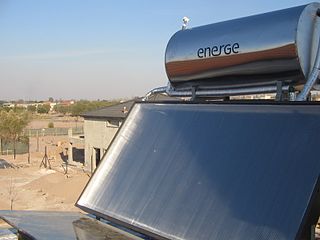
Solar thermal energy (STE) is a form of energy and a technology for harnessing solar energy to generate thermal energy for use in industry, and in the residential and commercial sectors. Solar thermal collectors are classified by the United States Energy Information Administration as low-, medium-, or high-temperature collectors. Low-temperature collectors are generally unglazed and used to heat swimming pools or to heat ventilation air. Medium-temperature collectors are also usually flat plates but are used for heating water or air for residential and commercial use.

Water heating is a heat transfer process that uses an energy source to heat water above its initial temperature. Typical domestic uses of hot water include cooking, cleaning, bathing, and space heating. In industry, hot water and water heated to steam have many uses.
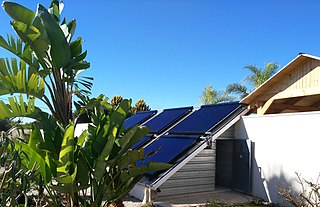
Solar water heating (SWH) is heating water by sunlight, using a solar thermal collector. A variety of configurations are available at varying cost to provide solutions in different climates and latitudes. SWHs are widely used for residential and some industrial applications.
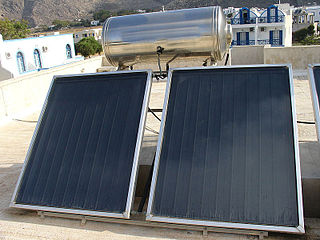
A solar thermal collector collects heat by absorbing sunlight. The term "solar collector" commonly refers to a device for solar hot water heating, but may refer to large power generating installations such as solar parabolic troughs and solar towers or non-water heating devices such as solar cookers or solar air heaters.
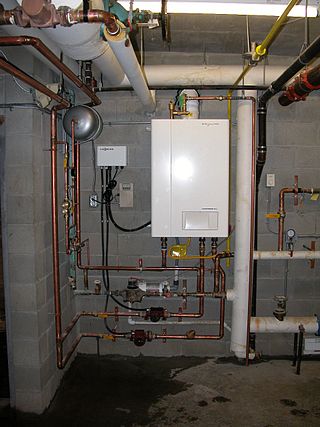
A central heating system provides warmth to a number of spaces within a building from one main source of heat. It is a component of heating, ventilation, and air conditioning systems, which can both cool and warm interior spaces.

Sugar plantations in the Caribbean were a major part of the economy of the islands in the 18th, 19th, and 20th centuries. Most Caribbean islands were covered with sugar cane fields and mills for refining the crop. The main source of labor, until the abolition of chattel slavery, was enslaved Africans. After the abolition of slavery, indentured laborers from India, China, Portugal and other places were brought to the Caribbean to work in the sugar industry. These plantations produced 80 to 90 percent of the sugar consumed in Western Europe, later supplanted by European-grown sugar beet.
Solar air conditioning, or "solar-powered air conditioning", refers to any air conditioning (cooling) system that uses solar power.

A solar combisystem provides both solar space heating and cooling as well as hot water from a common array of solar thermal collectors, usually backed up by an auxiliary non-solar heat source.

Renewable energy in Australia is mainly based on biomass, solar, wind, and hydro generation. Over a third of electricity is generated from renewables, and is increasing, with a target to phase out coal power before 2040. Wind energy and rooftop solar have particularly grown since 2010. The growth has been stimulated by government energy policy in order to limit the rate of climate change in Australia that has been brought about by the use of fossil fuels. Pros and cons of various types of renewable energy are being investigated, and more recently there have been trials of green hydrogen and wave power.

The Barbados Light & Power Company Limited is a wholly owned subsidiary of Emera Caribbean and currently the sole electricity utility provider in the country of Barbados. It started operations on 17 June 1911. The company claims it has over 100,000 customers. The fuel provided is natural gas and fuel oil.

Tourism is one of the Caribbean's major economic sectors, with 25 million visitors contributing $49 billion towards the area's gross domestic product in 2013, which represented 14% of its total GDP. It is often described as, "the most tourism-dependent region in the world".

Solar hot water refers to water heated by solar energy, a renewable energy source derived from the sun. This process involves thermal collectors, often called solar panels, which absorb solar energy to increase the temperature of the water. The heated water is then stored in a reservoir tank for future use. Solar hot water systems are utilised for a variety of purposes, including domestic and commercial water heating, contributing to heating and cooling systems, and providing process heat for industrial applications.

Barbadian–Nigerian relations are foreign relations between Barbados and Nigeria. Barbados and Nigeria formally established diplomatic relations on 24 April 1970. Nigeria is accredited to Barbados from its high commission in Port of Spain,. Currently the Barbadian Government does not have foreign accreditation for Nigeria, however the Nigerian Government has said that it was highly desirous of Barbados establishing a high commission directly in Nigeria.
Mastec, Inc. is an American multinational infrastructure engineering and construction company based in Coral Gables, Florida. The company provides engineering, building, installation, maintenance and upgrade of energy, utility and communications infrastructure. Its customers are primarily in the utility, communications and government industries.

Solar power in Maryland is supported by the state's legislation regarding the Renewable Portfolio Standard and Solar Renewable Energy Credit (SREC) program. The target for renewable energy as of 2017 is 20% by 2020, including 2% from solar power.
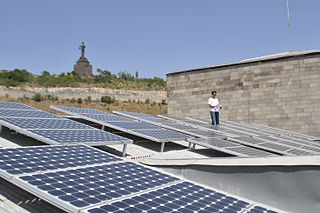
Solar energy is widely available in Armenia due to its geographical position and is considered a developing industry. In 2022 less than 2% of Armenia’s electricity was generated by solar power.
William L. A. Hinds is an expert in renewable energy sources of the West Indies, and advisor to the Prime Minister of Barbados.
















